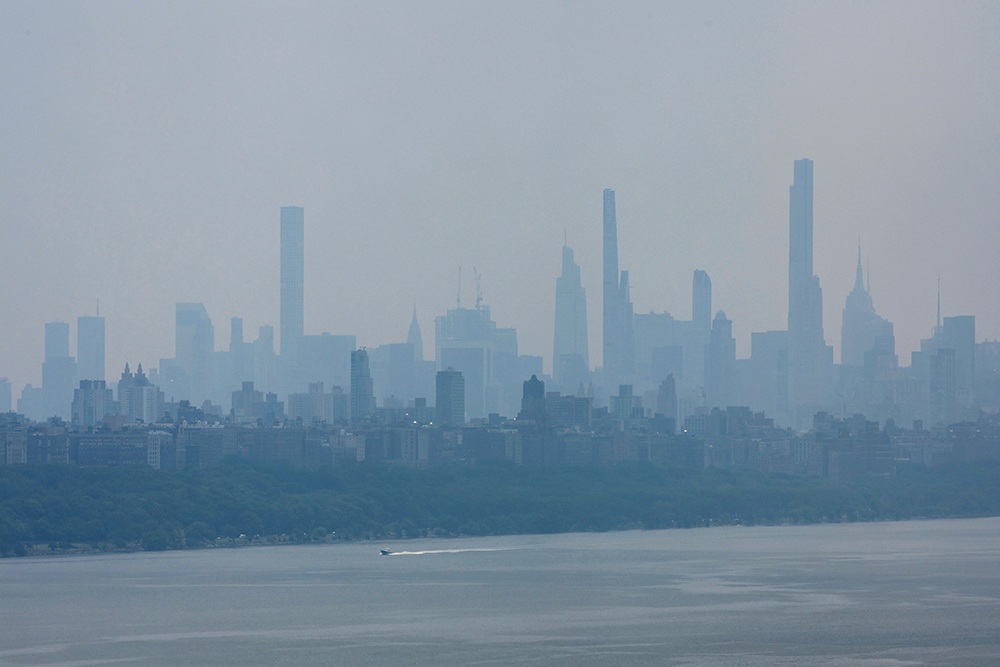
Residents of a riverside community carry food and containers of drinking water from an aid distribution due to the ongoing drought in Careiro da Varzea, Amazonas state, Brazil, Oct. 24, 2023. Earth last year shattered global annual heat records, numerous scientific bodies reported in early 2024. (AP/Edmar Barros, File)
The scientific community has confirmed what millions across the globe experienced throughout 12 months of life-threatening heat and record-breaking temperatures: 2023 was the hottest year ever on record.
The year offers a glimpse of what is to come if far more extensive and rapid actions aren't taken to limit human-driven climate change, said a Carmelite friar who specializes in climate science. But rather than despair at the latest dire forecasts of a world on fire, he suggested the reports instead represent the newest bits of evidence to empower Catholics and all people to do something about it.
"It is like when a doctor gives us the diagnosis of a serious illness and the data is that the patient's situation worsens," said Carmelite Fr. Eduardo Agosta Scarel, a senior adviser with Laudato Si' Movement and a visiting researcher in the climatology department at the University of Valencia in Spain. "We can sink into inaction, or we can fight to overcome it."
In the opening days of 2024, numerous scientific bodies employing different data sources and analyses — among them, NASA and the National Oceanic and Atmospheric Administration in the U.S., along with the European-based U.K. Met Office and Copernicus Climate Change Service — all reached the same conclusion that 2023 was the hottest year the planet has experienced since record-keeping began in the 1850s.

A man from a homeless encampment receives care from Circle The City's mobile medical unit on the 14th day of temperatures rising to 114 degrees Fahrenheit in Phoenix July 13, 2023. (OSV News/Reuters/Liliana Salgado)
That was true on land and in the ocean, according to NOAA, and was the hottest year recorded for the continents of North America, South America and Africa. For Europe and Asia, it ranked second. The result was hundreds of millions of people exposed to extreme heat.
Each month from June through December set records for highest land surface temperatures, with July the hottest month ever recorded. The oceans set records for water temperatures from April to December.
"The exceptional warming that we're experiencing is not something we've seen before in human history," Gavin Schmidt, director of NASA's Goddard Institute for Space Studies, said in a statement. "It’s driven primarily by our fossil fuel emissions, and we're seeing the impacts in heat waves, intense rainfall, and coastal flooding."
Greenhouse gas emissions released from burning coal, oil and gas trap heat in the atmosphere and are the primary drivers of climate change. While factors like El Niño and declining levels of cooling aerosols in the atmosphere contributed some to 2023's record-shattering temperatures, scientists were clear the main factor was emissions from fossil fuels.
The year 2023 surpassed the previously hottest year, 2016, by the largest margin ever, as well, NOAA confirmed. The hottest 10 years on record have all occurred in the past decade.
Looking ahead, 2024 has a one-in-three chance of exceeding 2023's record heat and is virtually certain to rank among the five hottest years.
"We will continue to see records broken and extreme events grow until emissions go to zero," NOAA chief scientist Sarah Kapnick said in a statement.

Haze and smoke caused by wildfires in Canada linger over the skyline of midtown Manhattan in New York City as seen from Fort Lee, New Jersey, June 8, 2023. (OSV News/Reuters/Mike Segar)
Beyond heat, extreme weather was on display in 2023. Raging wildfires in Canada burned upward of 45.7 million acres, more than twice the previous record for the continent. An above-average cyclone season in the Indian Ocean and global tropics included Cyclone Daniel, which left more than 10,000 people dead after striking eastern Libya in September. The sea ice extent in Antarctica hit a record-low annual maximum and minimum.
On Jan. 17, a report in the journal Nature indicated ice loss on the Greenland ice sheet was 20% greater than previously believed.
Average global temperature in 2023 was roughly 1.4 degrees Celsius (2.5 degrees Fahrenheit) above the late-19th century average, according to NASA, while Copernicus placed it nearly at 1.5 C (2.7 F) — the temperature limit nearly 200 countries agreed to pursue under the Paris Agreement. Average global temperatures are tracking to hit 1.5 C as soon as the early 2030s.
Climate scientists have stated that surpassing that threshold over an extended time frame could trigger potentially irreversible tipping points and expose millions more people to climate-related impacts like more extreme storms, flooding, droughts, heat waves and sea rise.
Taken together, the year-in-review reports offer "a foretaste that this projection [of reaching 1.5 C] will occur if we do not modify the human conditions that generate climate change," said Agosta, who holds a doctorate in atmospheric and oceanic sciences and is a member of several national meteorological associations.
Advertisement
Specifically, that means cutting global greenhouse gas emissions nearly in half by 2030, compared to 2019 levels, and reaching net-zero by midcentury, he said, repeating conclusions from the United Nations Intergovernmental Panel on Climate Change. And to do that will require moving beyond fossil fuels as the world's primary power source.
In December at the COP28 U.N. climate summit, nations for the first time agreed on the need to transition from fossil fuels — a step that scientists and environmental activists have urged for years but one that had never been included within a U.N.-negotiated document.
While the text lacks specifics on how or when to end the use of fossil fuels, Catholics and other people of faith have a role to play in holding their respective countries accountable — as Pope Francis has called for — and in a time frame in line with what the science says, Agosta said.
Signs of progress are present, including continued falling costs and swift adoption of renewable energy and hundreds of billions of dollars invested by governments in climate laws. In 2023, U.S. emissions declined, though not enough to be in line with its national climate pledge of cutting emissions by at least 50% by the end of the decade.

Activists mark the start of Climate Week in New York City Sept. 17, 2023, during a demonstration calling for the U.S. government to take action toward ending fossil fuel use in order to reduce the impact of global climate change. (OSV News/Reuters/Eduardo Munoz)
That has largely summarized global action on climate change to date: movement but not fast enough.
A member of the Holy See delegation at COP28, Agosta added that scientific data like the latest climate reports are empirical by nature and "devoid of moral sense, of a call to make decisions to generate adequate changes for the care of the common home. The latter must come from the world of values, of theological reflection, of faith."
"If one were left with only the scientific data, one would feel despair, discouragement and anguish," the Carmelite friar-scientist said.
Agosta added it's essential to pair prayer with efforts to address climate change, and to approach the challenges it poses "with hope, because we know that God never abandons his creatures." And to apply existing solutions, like renewable energy, to minimize a climate crisis and limit suffering and biological loss.
"We have a treatment at hand and we have to start implementing it."








